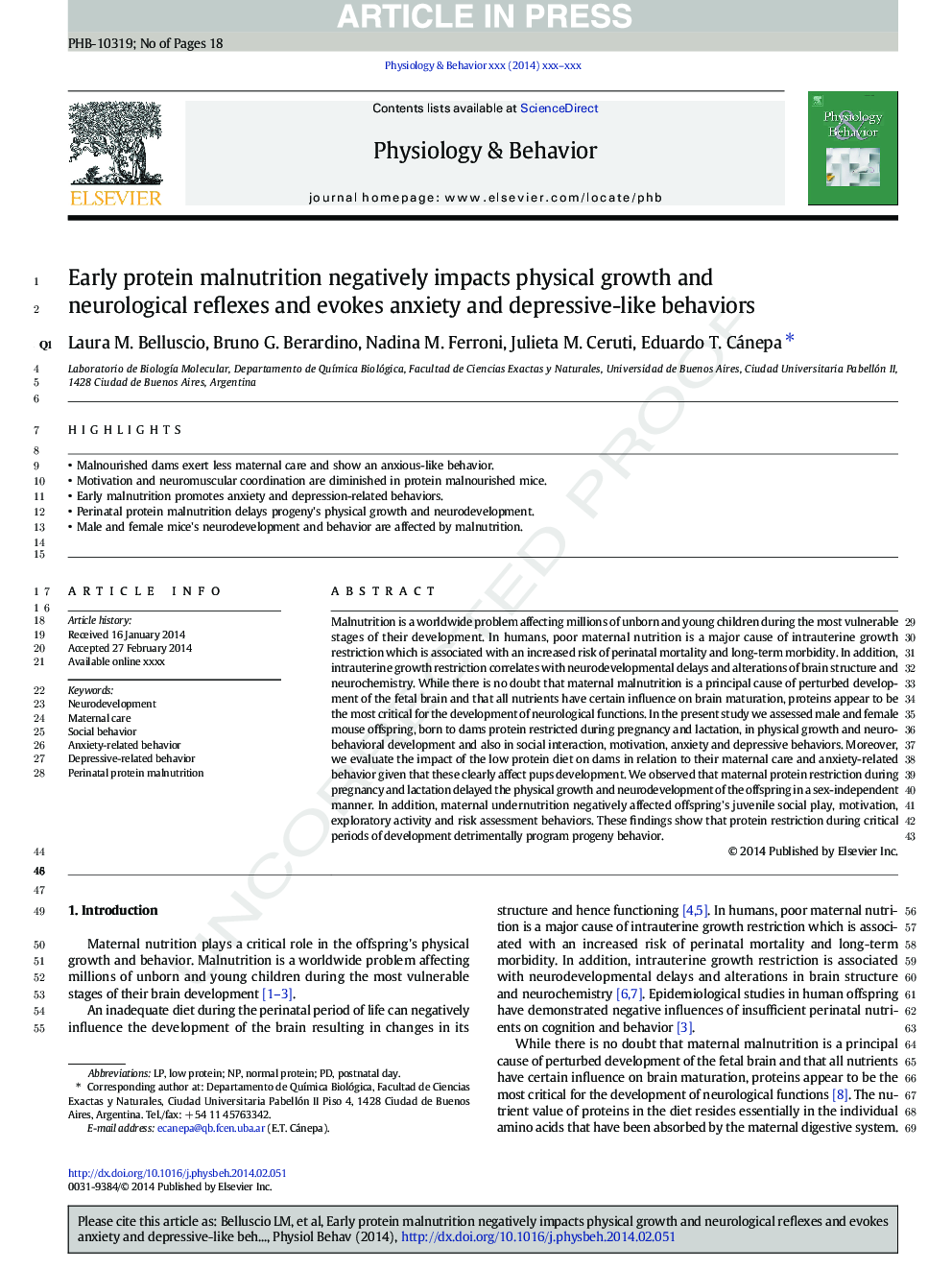| کد مقاله | کد نشریه | سال انتشار | مقاله انگلیسی | نسخه تمام متن |
|---|---|---|---|---|
| 5924312 | 1571188 | 2014 | 18 صفحه PDF | دانلود رایگان |
عنوان انگلیسی مقاله ISI
Early protein malnutrition negatively impacts physical growth and neurological reflexes and evokes anxiety and depressive-like behaviors
ترجمه فارسی عنوان
سوءتغذیه زود هنگام پروتئین منفی بر رشد فیزیکی و رفلکس های عصبی تاثیر می گذارد و موجب اضطراب و رفتارهای افسردگی می شود
دانلود مقاله + سفارش ترجمه
دانلود مقاله ISI انگلیسی
رایگان برای ایرانیان
کلمات کلیدی
ترجمه چکیده
سوء تغذیه یک مشکل جهانی است که میلیون ها نوزاد و نوزاد را در طول مراحل آسیب پذیری رشد خود تحت تاثیر قرار می دهد. در انسان، تغذیه مادران فقیر، علت اصلی محدودیت رشد داخل رحمی است که با افزایش خطر مرگ و میر حاملگی و مسمومیت درازمدت همراه است. علاوه بر این، محدودیت رشد داخل رحمی همبستگی با تاخیرهای عصبی توسعه و تغییرات ساختار مغز و نورو شیمی است. در حالی که شکی نیست که سوء تغذیه مادر یکی از دلایل اصلی تحریک تحریک مغز جنین است و همه مواد مغذی تأثیر خاصی بر بلوغ مغز دارند، پروتئین ها به عنوان مهم ترین عامل برای توسعه عملکرد عصبی هستند. در مطالعه حاضر، نوزادان موشهای مرد و زن متولد شده از پروتئین سم را در دوران بارداری و شیردهی، در رشد فیزیکی و توسعه عصبی رفتاری و همچنین در تعاملات اجتماعی، انگیزه، اضطراب و رفتارهای افسردگی محاسبه کردیم. علاوه بر این، اثرات رژیم کم پروتئین پروتئین بر سدها در ارتباط با مراقبت های مادران و رفتارهای مرتبط با اضطراب را با توجه به این که به طور واضح بر رشد نوزادان تاثیر می گذارد، ارزیابی می کنیم. ما مشاهده کردیم که محدودیت پروتئین مادر در دوران بارداری و شیردهی، رشد فیزیکی و رشد عصبی فرزندان را به شکل یک رابطه جنسی مستقل به تاخیر می اندازد. علاوه بر این، سوء تغذیه مادران منفی را تحت تاثیر قرار می دهد، بازی اجتماعی نوجوانان، انگیزه، فعالیت های اکتشافی و رفتارهای ارزیابی ریسک. این یافته ها نشان می دهد که محدودیت پروتئین در طی دوره های بحرانی توسعه رفتارهای نسل بعد را به شدت تحت تاثیر قرار می دهد.
موضوعات مرتبط
علوم زیستی و بیوفناوری
بیوشیمی، ژنتیک و زیست شناسی مولکولی
فیزیولوژی
چکیده انگلیسی
Malnutrition is a worldwide problem affecting millions of unborn and young children during the most vulnerable stages of their development. In humans, poor maternal nutrition is a major cause of intrauterine growth restriction which is associated with an increased risk of perinatal mortality and long-term morbidity. In addition, intrauterine growth restriction correlates with neurodevelopmental delays and alterations of brain structure and neurochemistry. While there is no doubt that maternal malnutrition is a principal cause of perturbed development of the fetal brain and that all nutrients have certain influence on brain maturation, proteins appear to be the most critical for the development of neurological functions. In the present study we assessed male and female mouse offspring, born to dams protein restricted during pregnancy and lactation, in physical growth and neurobehavioral development and also in social interaction, motivation, anxiety and depressive behaviors. Moreover, we evaluate the impact of the low protein diet on dams in relation to their maternal care and anxiety-related behavior given that these clearly affect pups development. We observed that maternal protein restriction during pregnancy and lactation delayed the physical growth and neurodevelopment of the offspring in a sex-independent manner. In addition, maternal undernutrition negatively affected offspring's juvenile social play, motivation, exploratory activity and risk assessment behaviors. These findings show that protein restriction during critical periods of development detrimentally program progeny behavior.
ناشر
Database: Elsevier - ScienceDirect (ساینس دایرکت)
Journal: Physiology & Behavior - Volume 129, 22 April 2014, Pages 237-254
Journal: Physiology & Behavior - Volume 129, 22 April 2014, Pages 237-254
نویسندگان
Laura M. Belluscio, Bruno G. Berardino, Nadina M. Ferroni, Julieta M. Ceruti, Eduardo T. Cánepa,
